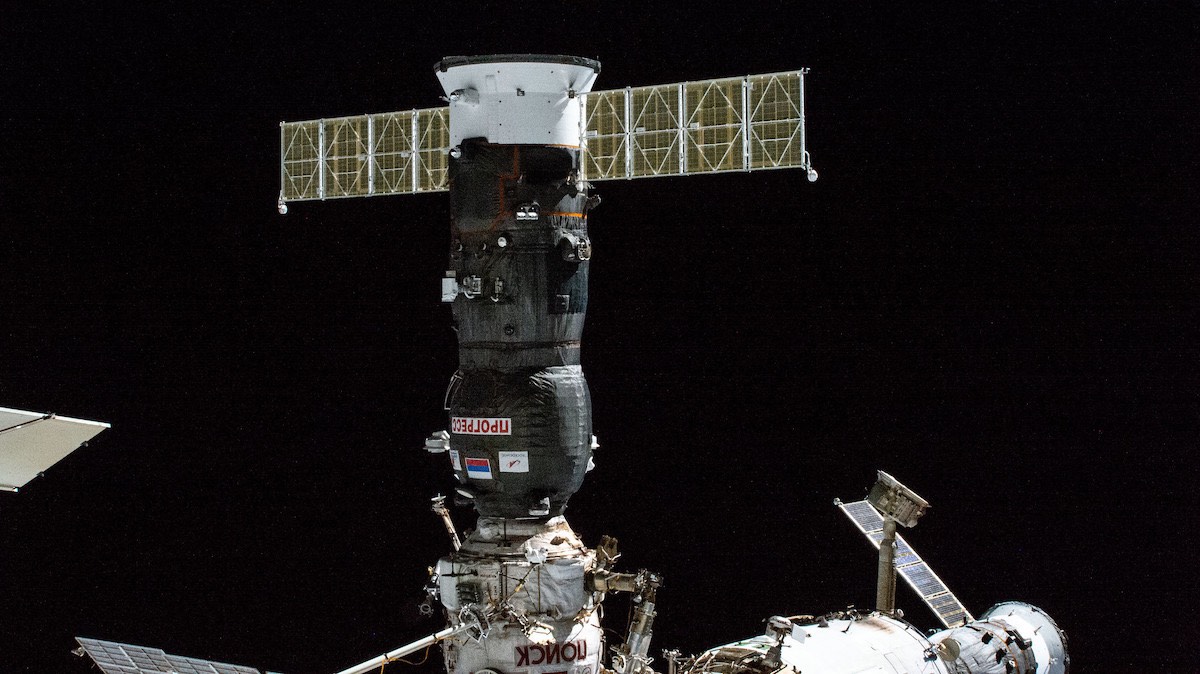Space News & Blog Articles
Watch live: Russian cargo ship set to depart space station after coolant leak
Russian cosmonauts will try to take pictures of the location where coolant leaked out of a Russian Progress cargo ship earlier this month when the supply freighter departs the International Space Station Friday night, as scheduled, to head for a destructive re-entry over the Pacific Ocean.
The Progress MS-21 cargo ship is scheduled to undock from space-facing Poisk module on the Russian segment of the space station at 9:26 p.m. EST Friday (0226 GMT Saturday), keeping a departure date that has been set for months. But the routine undocking will take special significance after the Progress MS-21 cargo ship suddenly leaked coolant last Saturday, Feb. 11, soon after the docking of a fresh Progress resupply spacecraft to a different port on the space station.
The timing of the leak soon after the docking of another Progress supply ship was presumably a coincidence, but it was the second time in less than two months that a Russian spacecraft suddenly lost its coolant fluid while docked at the international research complex. Russia’s Soyuz MS-22 crew ferry ship leaked coolant in December, an incident that Russian space agency officials previously blamed on a likely high-speed impact from a micrometeoroid, or a tiny fragment of rock from deep space.
Russian engineers continue analyzing the cause of the coolant leak on the unpiloted Progress MS-21 cargo ship, and officials have not said whether both leaks were caused by the same failure, or if both spaceships suffered untimely hits by space junk or micrometeoroids. The coolant on both vehicles is used to dissipate heat generated by internal spacecraft electronics, and maintain comfortable operating temperatures for computers, cargo, and people inside.
The 58-foot-long (17.6-meter) Canadian-built robotic arm inspected the damaged thermal control system radiator Progress MS-21 spacecraft’s rear instrumentation compartment earlier this week, according to Roscosmos, Russia’s space agency. Russian space officials decided to move ahead with the planned undocking and re-entry of the Progress MS-21 spacecraft, which is carrying trash and other unnecessary space station equipment for disposal.
“The reason for the coolant leak is continuing to be investigated between our NASA specialists and Roscosmos counterparts,” said Jeff Arend, manager of the International Space Station systems engineering and integration office at NASA’s Johnson Space Center in Houston. “An inspection was completed earlier this week using the Canadarm 2 to gather imagery of the suspected area, and the teams are evaluating that imagery.”
 The Progress MS-21 spacecraft docked at the International Space Station on Oct. 28. Credit: NASA
The Progress MS-21 spacecraft docked at the International Space Station on Oct. 28. Credit: NASA
Once the Progress spacecraft backs away from the space station, Russian cosmonauts will send commands to the supply ship to rotate its orientation by about 180 degrees to enable additional visual inspections of the area where the coolant leak occurred, Arend said Friday.
Then the cargo vehicle will move a safe distance away from the space station and fire its engines for a de-orbit burn at 11:03 p.m. EST (0403 GMT), setting up for a re-entry into the atmosphere over the Pacific Ocean around 11:45 p.m. EST (0445 GMT). Most of the Progress spacecraft and its cargo will burn up during re-entry. Progress MS-21 launched Oct. 25 and docked at the space station two days later with more than 2.5 tons of cargo, fuel and water.
The damaged Soyuz MS-22 spacecraft, meanwhile, is set to be replaced by a new Soyuz crew ferry ship that could launch from the Baikonur Cosmodrome in Kazakhstan later this month or in March. That launch of the Soyuz MS-23 spacecraft was postponed from Sunday, Feb. 19, to give Russian engineers more time to evaluate the cause of the Progress coolant leak.
The Soyuz MS-23 spacecraft will launch without any crew members. When it docks at the station, it will be the lifeboat for Russian cosmonauts Sergey Prokopyev, Dmitri Petelin, and NASA astronaut Frank Rubio, who will have their stay on the station extended by nearly six months until September, when they will return to Earth on Soyuz MS-23 after the launch of Soyuz MS-24 with their replacement crew.
This email address is being protected from spambots. You need JavaScript enabled to view it. the author.
Follow Stephen Clark on Twitter: @StephenClark1.
When you subscribe to the SpaceZE News Feed, we will send you an e-mail when there are new updates on the site so you wouldn't miss them.

